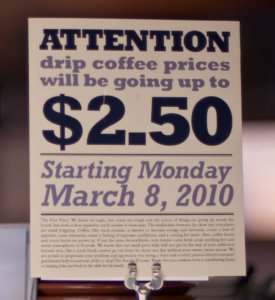Inflation is one of those things that the media talks about, but its something that nobody really takes the time to spell out.
Inflation means the purchasing power of your cash is eroded. Let us say, theoretically this means that if you save $100 under the mattress and inflation is 3% per year when you come back a year from now your $100 will buy 3% fewer goods. Said differently you would need $103 to buy the same amount of goods a year later.
When you extend this to 10 years you might think that it would mean that you would need $130 to buy the same amount of goods but because of the effects of compounding you would actually need slightly more. As time goes on the impact of “just” 3% inflation compounds making it even worse. Unfortunately, compound inflation is just like compound interest working against you. When you look at the effects of 3% inflation on your savings over 25 years we find that prices will have more than doubled and you will need $209.38 to buy the same basket of goods that $100 would buy 25 years earlier.
In other words, more inflation means your cash buys less – and the effects gets worse over time.
Inflation- A Leaking Bucket
Over the long run since 1914 inflation has averaged more than 3.3% (3.33% ). So as you are saving it is like trying to fill a bucket while 3% is leaking out. So therefore, you have to put it in faster than it leaks out. This means that when you saving you should find definitely try to maximize the amount of interest you are seeing on your savings, via a high yield checking or money market account. If you don’t you are losing money.
Inflation Causes Uncertainty
Understanding inflation also means understanding its psychological impact. Inflation often results in higher uncertainty. This has the effect of increase savings and discouraging investment. This is due to a couple of reasons. First, people don’t know whats going to happen with to the value of their money so they tend to save more. Also, because the value of your money is constantly changing, this makes financial planning difficult as there is significantly higher uncertainty – why would you invest in bonds or stocks if you don’t know what the value of them will be?
What about Bonds?
Bonds are debt obligations. Usually a government or a company issues bonds which usually pay you a fixed number of dollars at the end of the life of the bond as well as regular or ‘coupon’ payments. Historically, bonds are considered to do poorly during times of high inflation because the declining value of money eats into the value of both the bond and the coupon payments. In times of moderate inflation if the “coupon rate” i.e. the interest rate the bond is paying is high enough it can counteract the effects of inflation.
What about Taxes?
Taxes always play a role in your personal finances, inflation is no exception. Theoretically if inflation was 3% and your bank account paid 3% interest, you would still be losing because you would owe taxes on your 3% interest. So assuming you are in the 30% tax bracket only 2% would end up in your bucket and the other 1% would be diverted to the government leaving you with a loss of purchasing power. So with a 3% inflation rate you may need to earn 4% interest just to break even.
For more on these topics check out:
How Inflation Effects the Car Industry And Finance

